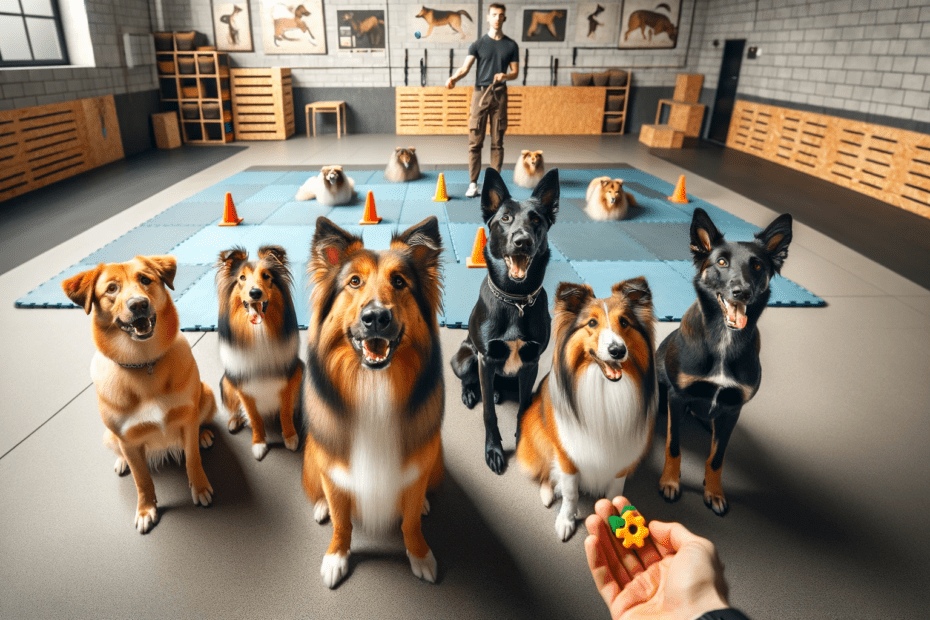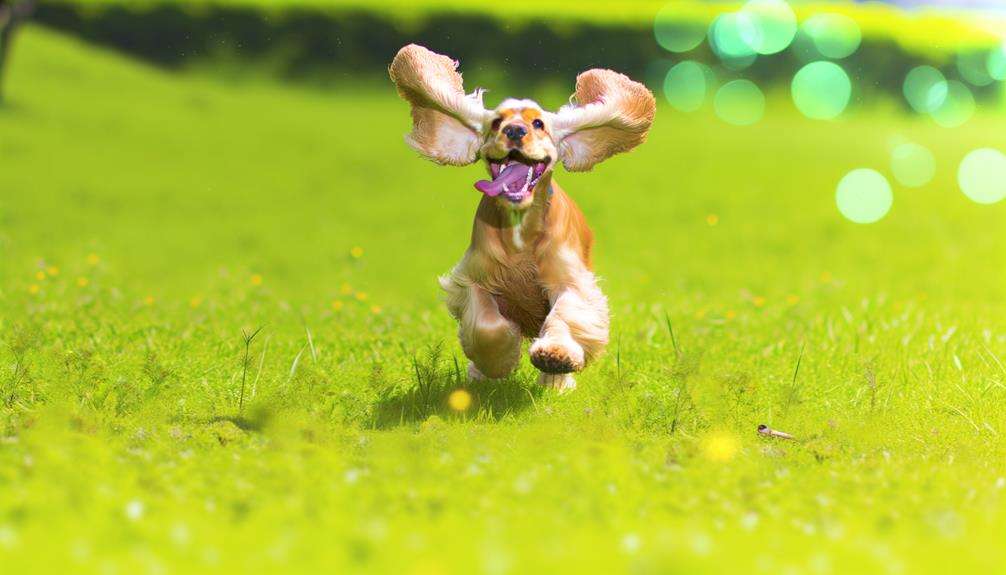If you're looking for a smart and obedient companion, you've come to the right place. This article will guide you through the top intelligent dog breeds for obedience training.
From the energetic Border Collie to the loyal German Shepherd and the friendly Golden Retriever, these breeds are known for their quick learning abilities and eagerness to please.
So, get ready to meet some of the most intelligent and trainable furry friends out there. Let's dive in!
Key Takeaways
- Border Collies, German Shepherds, Poodles, and Australian Shepherds are highly intelligent and trainable breeds for obedience training.
- Mental stimulation and exercise are essential for the satisfaction of these breeds.
- Positive reinforcement and a calm training environment are important for successful training.
- Consistency, clear rules, and proper training techniques are necessary to shape these breeds into obedient companions.
Border Collie
If you're looking for a highly intelligent and trainable canine companion, the Border Collie is a breed that you should definitely consider. Border Collies are renowned for their exceptional intelligence and problem-solving skills, which make them one of the most trainable breeds. Their ability to quickly learn and retain new commands is truly remarkable. When it comes to border collie intelligence, they're often considered at the top of the list.
To effectively train a Border Collie, it's important to understand their unique needs and personality traits. These dogs thrive on mental stimulation and require plenty of exercise to keep them physically and mentally satisfied. Engaging them in activities such as obedience training, agility exercises, and interactive games can help channel their intelligence and energy in a positive way.
When it comes to border collie training techniques, positive reinforcement is key. These dogs respond well to praise, treats, and rewards for good behavior. Consistency and patience are also crucial in their training process. Border Collies are highly sensitive to their owner's emotions and can detect any frustration or impatience, which can hinder their learning progress. Therefore, it's important to maintain a calm and positive training environment.
German Shepherd
When it comes to trainability, German Shepherds are known for their intelligence and willingness to learn. These dogs excel in obedience tasks, making them a popular choice for police and military work.
To effectively train a German Shepherd, it's important to establish clear rules and boundaries, provide consistent and positive reinforcement, and engage them in mentally stimulating activities.
German Shepherd's Trainability
You can easily train a German Shepherd due to their high level of intelligence and obedience. German Shepherds are known for their exceptional trainability, making them one of the top choices for obedience training.
Their intelligence allows them to quickly understand and learn new commands, making the training process efficient and effective. This breed is known for their working abilities, as they were originally bred for herding and guarding livestock.
Their natural instincts and willingness to please their owners make them highly trainable in various tasks, such as search and rescue, police work, and service dog tasks. German Shepherds excel in obedience competitions, agility trials, and other working dog activities, showcasing their exceptional trainability and versatility.
With consistency, positive reinforcement, and proper training techniques, you can shape your German Shepherd into a well-mannered and obedient companion.
Obedience Tasks for Shepherds
German Shepherds excel in a variety of obedience tasks. They're highly intelligent and trainable, making them ideal candidates for advanced obedience training. Here are three obedience tasks that Shepherds can master with the right training techniques:
- Agility: Shepherds are naturally athletic and agile, making them perfect for agility training. They can easily navigate through obstacle courses, jump over hurdles, and weave through poles. This not only improves their physical fitness but also enhances their mental acuity.
- Tracking: Shepherds have an exceptional sense of smell, making them excellent at tracking tasks. They can be trained to follow scents and locate specific objects or individuals. This skill is particularly valuable in search and rescue operations or detecting illegal substances.
- Protection: Shepherds have a natural instinct to protect their family and territory. With proper training, they can learn to respond to commands and protect their owners on command. This obedience task requires specialized training techniques to ensure the safety of both the dog and the handler.
While Shepherds are highly trainable, they do come with their own set of challenges. Their high energy levels and strong protective instincts can sometimes make them stubborn or overly reactive. Patience, consistency, and positive reinforcement are crucial in overcoming these challenges and achieving successful obedience training with Shepherds.
Training Tips for Shepherds
To effectively train your Shepherd, incorporate these essential tips to maximize success and strengthen your bond.
- German Shepherds are highly intelligent and trainable dogs, making them ideal for advanced obedience training techniques.
- Start by establishing yourself as the pack leader through consistent and firm leadership.
- Use positive reinforcement methods, such as treats and praise, to reward desired behaviors and motivate your Shepherd.
- Consistency is key, so make sure to set clear rules and expectations, and enforce them consistently.
- Incorporate mental stimulation exercises, such as puzzle toys and obedience drills, to keep your Shepherd engaged and prevent boredom.
- Finally, remember to be patient and understanding during the training process, as every dog learns at their own pace.
With these training tips, you'll be on your way to a well-trained and obedient Shepherd.
Golden Retriever
The Golden Retriever's intelligence makes it an ideal breed for obedience training. These dogs are known for their friendly and eager-to-please nature, which makes them highly trainable. Here are three reasons why Golden Retrievers excel in obedience training:
- Temperament: Golden Retrievers have a calm and gentle temperament, making them easy to work with during training sessions. They're patient, tolerant, and love to please their owners. This breed is known for its loyalty and willingness to learn, which makes them highly responsive to obedience training. Their friendly nature also makes them great with children and other pets.
- Intelligence: Golden Retrievers are highly intelligent dogs. They're quick learners and have a strong desire to please their owners. This intelligence allows them to understand and follow commands easily, making obedience training a breeze. With consistent and positive reinforcement, Golden Retrievers can quickly master basic commands and even more advanced training exercises.
- Grooming Needs: While grooming may not directly relate to obedience training, it's an essential aspect of caring for a Golden Retriever. These dogs have a thick, water-resistant coat that requires regular brushing to prevent matting and keep it in good condition. Regular grooming sessions can also be used as a bonding activity with your Golden Retriever, strengthening your relationship and trust. Additionally, grooming provides an opportunity to check for any skin issues or health concerns.
Poodle
If you're looking for a highly intelligent and trainable dog breed, consider the Poodle. Poodles are known for their exceptional intelligence and ability to learn quickly, making them one of the top choices for obedience training.
One of the key characteristics of the Poodle breed is their hypoallergenic coat, which requires regular grooming to keep it in top condition. Their curly, dense hair is prone to matting, so regular brushing is necessary to prevent tangles and maintain a healthy coat.
In addition to grooming, the Poodle's breed characteristics include their high energy level and need for mental stimulation. They thrive in an active environment and require daily exercise to keep them physically and mentally satisfied.
Poodles are also highly social dogs and enjoy being around people and other pets. They're known for their loyalty and make excellent family pets. When properly trained and socialized, Poodles are well-behaved and obedient companions.
Doberman Pinscher
When it comes to obedience training, the Doberman Pinscher is a breed that stands out. Known for their intelligence and trainability, Dobermans excel in obedience tasks and can quickly learn commands.
To ensure successful training, it's important to use positive reinforcement techniques and provide consistent and firm guidance. With proper training, Dobermans can master advanced commands and become well-behaved and obedient companions.
Doberman's Obedience Training
For successful obedience training with a Doberman Pinscher, start by establishing clear rules and boundaries. This breed is known for its intelligent and strong-willed nature, making it crucial to provide consistent and firm guidance. Here are three key factors to consider when training a Doberman:
- Temperament: Dobermans are known for their loyalty, protectiveness, and high energy levels. Understanding their temperament is essential for effective training. They thrive in structured environments and require mental stimulation to prevent boredom-related behaviors.
- Intelligence: Dobermans rank high in intelligence, making them quick learners. However, their intelligence can sometimes lead to stubbornness. Utilize positive reinforcement techniques, such as rewards and praise, to keep them engaged and motivated.
- Socialization: Early and ongoing socialization is crucial for Dobermans. Exposing them to various people, animals, and environments will help develop their confidence and ensure they become well-rounded and obedient companions.
Training Tips for Dobermans
To effectively train your Doberman Pinscher, incorporate these training tips into your routine.
Dobermans are intelligent and eager to please, making them highly trainable. When it comes to training methods for Dobermans, positive reinforcement works best. Use treats, praise, and rewards to motivate and reinforce good behavior.
Be consistent with your commands and expectations, as inconsistency can confuse your Doberman.
Socialization is crucial for Dobermans, as they can be protective and wary of strangers. Introduce them to different people, animals, and environments from a young age to prevent aggression and fearfulness.
Additionally, address common behavioral issues in Dobermans, such as separation anxiety and excessive barking, through training and providing mental and physical stimulation.
Remember to be patient and persistent, as training a Doberman may take time and effort.
Dobermans and Advanced Commands
Master advanced commands with your Doberman Pinscher, an intelligent and trainable breed. Dobermans excel in agility training, showcasing their athletic abilities and nimble movements. With their natural athleticism and high energy levels, they thrive in activities that challenge their physical abilities. Agility training not only helps to keep them physically fit but also mentally stimulated. Your Doberman will love the challenge of navigating through tunnels, weaving through poles, and jumping over hurdles.
In addition to agility training, Dobermans also excel in scent detection training. Their keen sense of smell and strong work ethic make them perfect candidates for this type of training. Whether it's searching for hidden objects or detecting specific scents, your Doberman will impress you with their accuracy and dedication. Scent detection training provides mental stimulation and a rewarding task that taps into their natural instincts.
Australian Shepherd
The Australian Shepherd's intelligence makes it a top choice for obedience training. This breed is known for its herding abilities, making it highly trainable and responsive to commands. Australian Shepherds have a natural instinct to gather and control livestock, which translates well into obedience training. Their intelligence allows them to quickly understand and execute commands, making them efficient learners.
In addition to their herding abilities, Australian Shepherds excel in agility training due to their intelligence. They're highly adaptable and can easily navigate through obstacle courses, showcasing their problem-solving skills and quick thinking. Their natural athleticism and willingness to please their owners make them ideal candidates for agility training.
When it comes to obedience training, Australian Shepherds thrive on mental stimulation and challenges. They enjoy learning new commands and tasks, and their intelligence allows them to pick up on cues and signals quickly. This breed is highly trainable and excels in obedience competitions.
To bring out the best in your Australian Shepherd, it's important to provide consistent training, mental stimulation, and positive reinforcement. With their intelligence and eagerness to please, Australian Shepherds can become well-behaved and obedient companions with the right training and guidance.
Labrador Retriever
When training a Labrador Retriever, you can expect their intelligence and trainability to shine through. These lovable and friendly dogs aren't only popular family pets but also excel in obedience training.
Here are three obedience training tips for Labrador Retrievers:
- Start Early: Labrador Retrievers are known for their high energy levels and eagerness to please their owners. Begin their training as early as possible to establish good habits and prevent any potential behavior problems. Consistency is key, so set a regular training schedule and stick to it.
- Use Positive Reinforcement: Labrador Retrievers respond well to positive reinforcement techniques. Reward their good behavior with treats, praise, and affection. Avoid using harsh punishments or negative reinforcement, as it can create fear or anxiety in these sensitive dogs.
- Be Patient and Persistent: Labrador Retrievers may have a tendency to be easily distracted due to their curious nature. Stay patient and persistent during training sessions, using short and focused sessions to keep their attention. Break down commands into smaller steps to make it easier for them to understand and succeed.
Frequently Asked Questions
Are These Intelligent Dog Breeds Suitable for First-Time Dog Owners?
Intelligent dog breeds can be suitable for first-time owners, but they may be more prone to behavior problems if not properly trained and stimulated. Providing mental stimulation is crucial for their well-being.
How Long Does It Take to Train an Intelligent Dog Breed?
To keep your intelligent dog breed motivated during training, use positive reinforcement and rewards. Enrolling them in obedience classes can also benefit their learning. Training duration varies but consistency and patience are key.
Can These Intelligent Dog Breeds Be Trained for Specific Tasks or Jobs?
Yes, these intelligent dog breeds can excel in sports or agility training. They have the mental and physical capabilities to perform well in these activities. Additionally, they can be trained as service dogs, assisting individuals with various tasks.
Are There Any Specific Challenges or Difficulties in Training These Intelligent Dog Breeds?
Overcoming stubbornness and managing high energy levels can be challenging when training intelligent dog breeds. As a first-time dog owner, you must consider the pros and cons of owning such breeds to ensure a successful training experience.
What Are Some Common Mistakes to Avoid When Training an Intelligent Dog Breed?
When training an intelligent dog breed, it's important to avoid common mistakes. Focus on using effective training methods that engage their intellect and provide consistent, positive reinforcement. Stay patient and remember that consistency is key.
Conclusion
In conclusion, when it comes to obedience training, the top intelligent dog breeds to consider are the Border Collie, German Shepherd, Golden Retriever, Poodle, Doberman Pinscher, Australian Shepherd, and Labrador Retriever. These breeds have proven to be highly trainable and responsive to commands.
Their intelligence, coupled with their eagerness to please, make them excellent choices for obedience training. By choosing one of these breeds, you can have confidence in your dog's ability to quickly learn and follow commands, resulting in a well-behaved and obedient companion.






